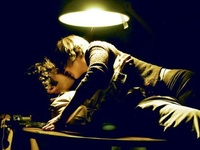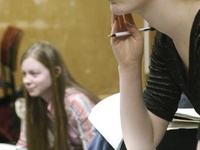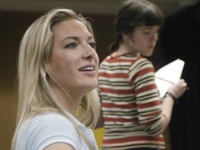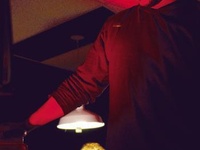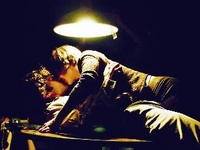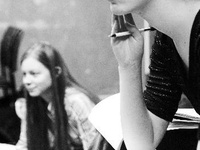A first-time director for HRDC, Spillane-Hinks knew landing the show at the Ex might prove a bit of a challenge. She admits that if the Ex hadn’t accepted Top Girls, she couldn’t have performed it at another venue due to the considerable resources specific to the stage. However, the process of application, admittance and now direction has been an incredibly “In acting, you work on your technique and your analysis, but the fact is the director has the ultimate say,” she says. “So to have that kind of intellectual agency in the process, as the director, it’s really wonderful.”
Though the show constantly grapples with weighty themes, Spillane-Hinks quells any fears that Top Girls is merely an intellectual discourse rather than character-based theater. She says that during her first reading, she was “struck by the simultaneously huge issues of politics and culture and gender that were going on in the play while at the same time, the basic human relationships were not compromised.”
Co-producer Katherine J. Thompson ’05 also highlights the show’s humor, drawn largely from the anachronistic clash of the characters. “It’s hilarious and at times confusing, but in this great way where it’s a mix of ideas sort of coming at you from all directions,” says Thompson. “It’s also got amazing accents. I would almost see it just for that.”
MAINSTAGE MADNESS
The Mainstage, the Loeb’s other, significantly larger venue will kick off their spring season the week following spring break. In addition to the musical Sunday in the Park with George, which will run from the final week of April until May 8th, the Mainstage will also house a fresh take on Tom Stoppard’s popular play, Rosencrantz and Guildenstern Are Dead for a two-week run from April 9-17.
The Mainstage—arguably the most coveted and most technically challenging theatre space available for undergraduates—has been embraced by director Jeremy W. Blocker ‘04, who brings experience as a producer, two-time Loeb Ex director and former HRDC vice president to the show.
“Experience is key for any director trying to tackle the Mainstage,” Blocker wrote in an e-mail. And to that end, Blocker says he has emphasized preparing and planning productive rehearsals and creating an atmosphere that allows for the creativity of collaborating members to flourish as crucial jobs for a director in any setting.
But Blocker says his experiences in the Harvard theater community have proven especially useful in directing the Mainstage, as it has enabled him to seek out assistance when he needs it, from those with greater familiarity with the space.
“I have experience asking for help and I know who I can turn to in various situations. When it comes down to it, every student director is just that—a student,” he says.Among those Blocker turns to are the professionals at the American Repertory Theatre (ART), who share the space with undergraduates during the regular season and work with students in mounting the Mainstage.
“It’s a difficult space to tackle, and it helps to have a staff that knows the territory and a cast that is prepared to face the challenge,” he says. Blocker’s production team include Mainstage veterans Sarah E. Curtis ’05 and Jess M. Matthews ’05, and Executive Producer Claire A. Pasternack ’05, who is also a Crimson editor.
The cast also includes seasoned Harvard theater community members, including Geordie F. Broadwater ’04, who directed last semester’s Mainstage show, Temptation, and Bobby A. Hodgson ’05, the current president of the HRDC.
Hodgson and Broadwater star as Rosencrantz and Guildenstern, respectively, taking on two of contemporary theater’s most celebrated antiheros. Stoppard’s black comedy and one of his most popular works to date, follows Hamlet’s hapless and disoriented friends who wander through the Danish court, between England and their imminent death—in events that seem always controlled by forces beyond their control.
“It’s a play about feelings of powerlessness and ignorance of the world around you,” Hodgson says. The themes of play will be reflected not only in the interactions between actors, he says, but in the inventive stage set-up that will incorporate trick staircases and M.C. Escher-inspired backdrops.
“[Rosencrantz and Guildenstern Are Dead] is a difficult piece—something that we are rediscovering in rehearsal every day-but it is an accessible one,” Blocker says.
He adds that “the space allows us to fully create this world in which we are setting the play—a world that grows out of confusion and fear in which up is down and down is up and our protagonists have no control.”
Read more in Arts
Portrait: Tom Conley








